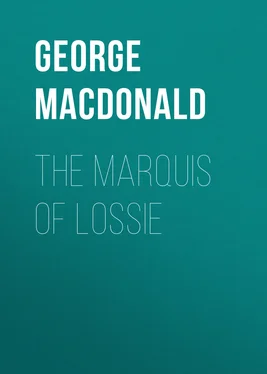George MacDonald - The Marquis of Lossie
Здесь есть возможность читать онлайн «George MacDonald - The Marquis of Lossie» — ознакомительный отрывок электронной книги совершенно бесплатно, а после прочтения отрывка купить полную версию. В некоторых случаях можно слушать аудио, скачать через торрент в формате fb2 и присутствует краткое содержание. Жанр: foreign_prose, foreign_religion, foreign_antique, на английском языке. Описание произведения, (предисловие) а так же отзывы посетителей доступны на портале библиотеки ЛибКат.
- Название:The Marquis of Lossie
- Автор:
- Жанр:
- Год:неизвестен
- ISBN:нет данных
- Рейтинг книги:3 / 5. Голосов: 1
-
Избранное:Добавить в избранное
- Отзывы:
-
Ваша оценка:
- 60
- 1
- 2
- 3
- 4
- 5
The Marquis of Lossie: краткое содержание, описание и аннотация
Предлагаем к чтению аннотацию, описание, краткое содержание или предисловие (зависит от того, что написал сам автор книги «The Marquis of Lossie»). Если вы не нашли необходимую информацию о книге — напишите в комментариях, мы постараемся отыскать её.
The Marquis of Lossie — читать онлайн ознакомительный отрывок
Ниже представлен текст книги, разбитый по страницам. Система сохранения места последней прочитанной страницы, позволяет с удобством читать онлайн бесплатно книгу «The Marquis of Lossie», без необходимости каждый раз заново искать на чём Вы остановились. Поставьте закладку, и сможете в любой момент перейти на страницу, на которой закончили чтение.
Интервал:
Закладка:
"But as to yourself, MacPhail – where are you going to go?" said Florimel. "I don't like to send you away, but, if I keep you, I don't know what to do with you. No doubt you could serve in the house, but that would not be suitable at all to your education and previous life."
"A body wad tak' you for a granny grown!" said Malcolm to himself. But to Florimel he replied – "If your ladyship should wish to keep Kelpie, you will have to keep me too, for not a creature else will she let near her."
"And pray tell me what use then can I make of such an animal," said Florimel.
"Your ladyship, I should imagine, will want a groom to attend you when you are out on horseback, and the groom will want a horse – and here am I and Kelpie!" answered Malcolm.
Florimel laughed.
"I see," she said. "You contrive I shall have a horse nobody can manage but yourself."
She rather liked the idea of a groom so mounted, and had too much well justified faith in Malcolm to anticipate dangerous results.
"My lady," said Malcolm, appealing to her knowledge of his character to secure credit, for he was about to use his last means of persuasion, and as he spoke, in his eagerness he relapsed into his mother tongue, – "My lady, did I ever tell ye a lee?"
"Certainly not, Malcolm, so far as I know. Indeed I am sure you never did," answered Florimel, looking up at him in a dominant yet kindly way.
"Then," continued Malcolm, "I'll tell your ladyship something you may find hard to believe, and yet is as true as that I loved your ladyship's father. – Your ladyship knows he had a kindness for me."
"I do know it," answered Florimel gently, moved by the tone of Malcolm's voice, and the expression of his countenance.
"Then I make bold to tell your ladyship that on his deathbed your father desired me to do my best for you – took my word that I would be your ladyship's true servant."
"Is it so, indeed, Malcolm?" returned Florimel, with a serious wonder in her tone, and looked him in the face with an earnest gaze. She had loved her father, and it sounded in her ears almost like a message from the tomb.
"It's as true as I stan' here, my leddy," said Malcolm.
Florimel was silent for a moment. Then she said, "How is it that only now you come to tell me?"
"Your father never desired me to tell you, my lady – only he never imagined you would want to part with me, I suppose. But when you did not care to keep me, and never said a word to me when you went away, I could not tell how to do as I had promised him. It wasn't that one hour I forgot his wish, but that I feared to presume; for if I should displease your ladyship my chance was gone. So I kept about Lossie House as long as I could, hoping to see my way to some plan or other. But when at length Mr Crathie turned me away, what was I to do but come to your ladyship? And if your ladyship will let things be as before in the way of service, I mean – I canna doot, my leddy, but it'll be pleesant i' the sicht o' yer father, whanever he may come to ken o' 't, my lady."
Florimel gave him a strange, half startled look. Hardly more than once since her father's funeral had she heard him alluded to, and now this fisher lad spoke of him as if he were still at Lossie House.
Malcolm understood the look.
"Ye mean, my leddy – I ken what ye mean," he said. "I canna help it. For to lo'e onything is to ken't immortal. He's livin' to me, my lady."
Florimel continued staring, and still said nothing.
I sometimes think that the present belief in mortality is nothing but the almost universal although unsuspected unbelief in immortality grown vocal and articulate.
But Malcolm gathered courage and went on,
"An' what for no, my leddy?" he said, floundering no more in attempted English, but soaring on the clumsy wings of his mother dialect. "Didna he turn his face to the licht afore he dee'd? an' him 'at rase frae the deid said 'at whaever believed in him sud never dee. Sae we maun believe 'at he's livin', for gien we dinna believe what he says, what are we to believe, my leddy?"
Florimel continued yet a moment looking him fixedly in the face. The thought did arise that perhaps he had lost his reason, but she could not look at him thus and even imagine it. She remembered how strange he had always been, and for a moment had a glimmering idea that in this young man's friendship she possessed an incorruptible treasure. The calm, truthful, believing, almost for the moment enthusiastic, expression of the young fisherman's face wrought upon her with a strangely quieting influence. It was as if one spoke to her out of a region of existence of which she had never even heard, but in whose reality she was compelled to believe because of the sound of the voice that came from it.
Malcolm seldom made the mistake of stamping into the earth any seeds of truth he might cast on it: he knew when to say no more, and for a time neither spoke. But now for all the coolness of her upper crust, Lady Florimel's heart glowed – not indeed with the power of the shining truth Malcolm had uttered, but with the light of gladness in the possession of such a strong, devoted, disinterested squire.
"I wish you to understand," she said at length, "that I am not at present mistress of this house, although it belongs to me. I am but the guest of Lady Bellair who has rented it of my guardians. I cannot therefore arrange for you to be here. But you can find accommodation in the neighbourhood, and come to me every day for orders. Let me know when your mare arrives: I shall not want you till then. You will find room for her in the stables. You had better consult the butler about your groom's livery."
Malcolm was astonished at the womanly sufficiency with which she gave her orders. He left her with the gladness of one who has had his righteous desire, held consultation with the butler on the matter of the livery, and went home to his lodging. There he sat down and meditated.
A strange new yearning pity rose in his heart as he thought about his sister and the sad facts of her lonely condition. He feared much that her stately composure was built mainly on her imagined position in society, and was not the outcome of her character. Would it be cruelty to destroy that false foundation, hardly the more false as a foundation for composure that beneath it lay a mistake? – or was it not rather a justice which her deeper and truer self had a right to demand of him? At present, however, he need not attempt to answer the question. Communication even such as a trusted groom might have with her, and familiarity with her surroundings, would probably reveal much. Meantime it was enough that he would now be so near her that no important change of which others might be aware, could well approach her without his knowledge, or anything take place without his being able to interfere if necessary.
CHAPTER XIII: TWO CONVERSATIONS
The next day Wallis came to see Malcolm and take him to the tailor's. They talked about the guests of the previous evening.
"There's a great change on Lord Meikleham," said Malcolm.
"There is that," said Wallis. "I consider him much improved. But you see he's succeeded; he's the earl now, and Lord Liftore – and a menseful, broad shouldered man to the boot of the bargain. He used to be such a windle straw!"
In order to speak good English, Wallis now and then, like some Scotch people of better education, anglicized a word ludicrously.
"Is there no news of his marriage?" asked Malcolm, adding, "they say he has great property."
"My love she's but a lassie yet," said Wallis, "– though she too has changed quite as much as my lord."
"Who are you speaking of?" asked Malcolm, anxious to hear the talk of the household on the matter.
"Why, Lady Lossie, of course. Anybody with half an eye can see as much as that."
Читать дальшеИнтервал:
Закладка:
Похожие книги на «The Marquis of Lossie»
Представляем Вашему вниманию похожие книги на «The Marquis of Lossie» списком для выбора. Мы отобрали схожую по названию и смыслу литературу в надежде предоставить читателям больше вариантов отыскать новые, интересные, ещё непрочитанные произведения.
Обсуждение, отзывы о книге «The Marquis of Lossie» и просто собственные мнения читателей. Оставьте ваши комментарии, напишите, что Вы думаете о произведении, его смысле или главных героях. Укажите что конкретно понравилось, а что нет, и почему Вы так считаете.












